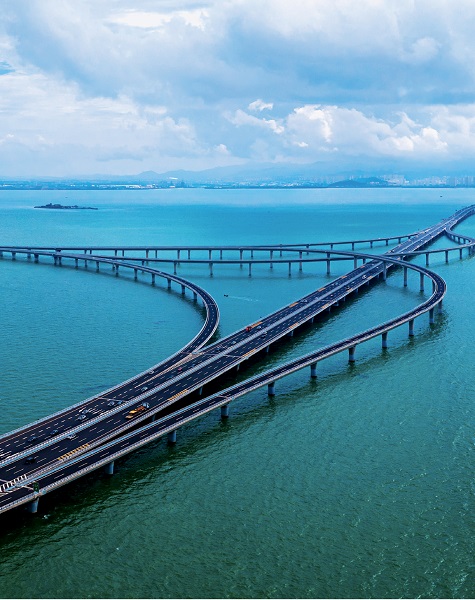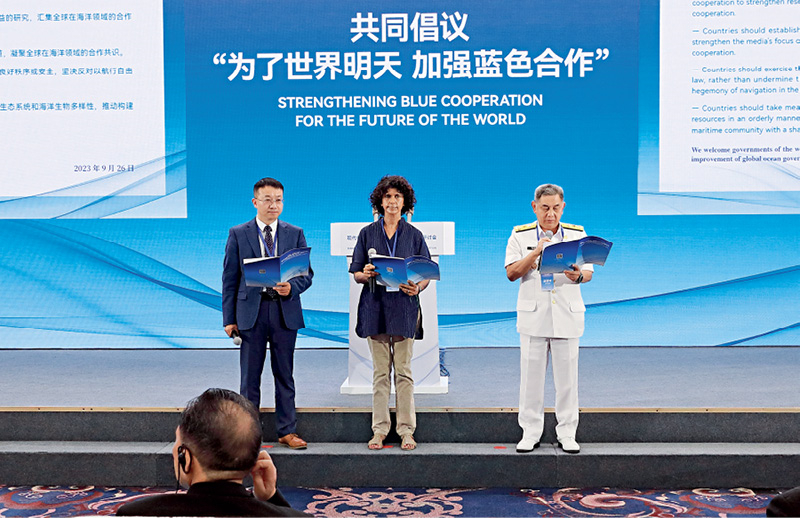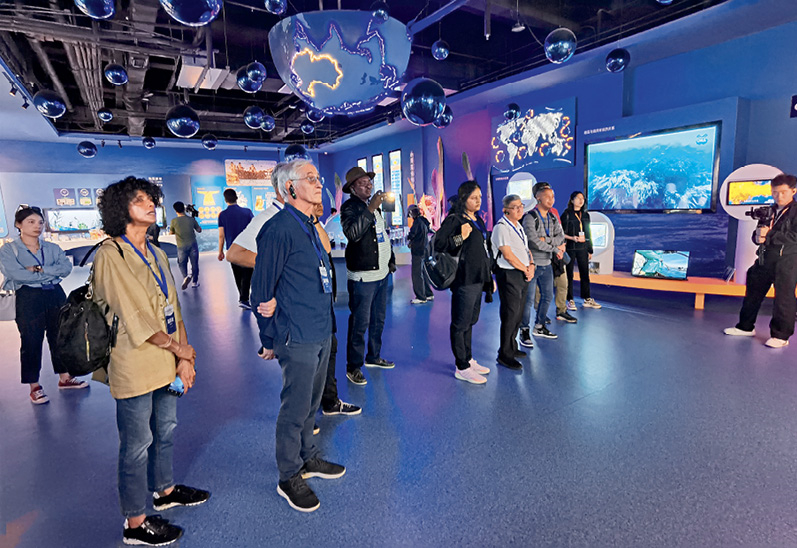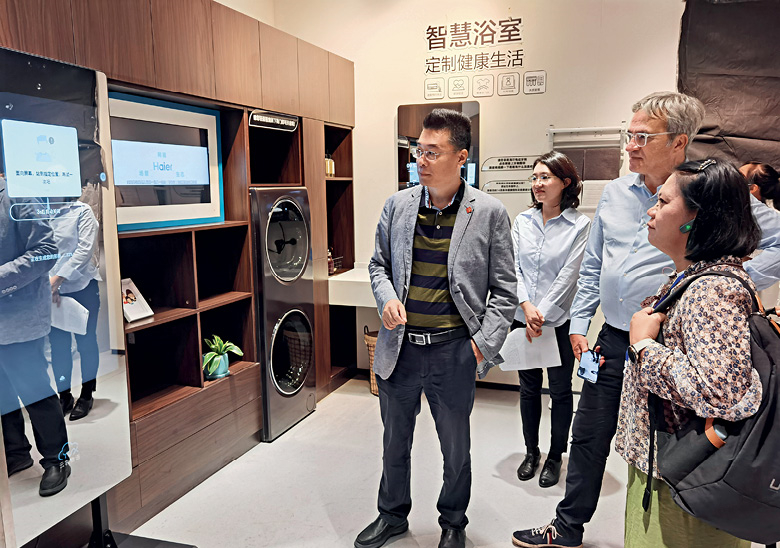It has become a global consensus that countries should strengthen blue cooperation for the future of the world, about which China has its stories to tell.

Jiaozhou Bay Bridge is a cross-water passage linking the Huangdao, Chengyang, and Licang districts and Jiaozhou City in Qingdao, east China’s Shandong Province.
Javier Garcia, former head of Spanish news agency Agencia EFE’s office in Beijing, describes an appalling scene he witnessed in his home city in Spain last summer. The water of the nearby Atlantic Ocean was the warmest he had ever found and tens of thousands of clams were found dead floating in the ocean and lying on the beaches. “It showed us cruelly in real time that we must act resolutely against climate change and marine pollution,” the veteran journalist told China Today. All nations must act urgently – and together – to improve ocean governance.
In a way, Garcia was echoing what Chinese President Xi Jinping had said in 2019, during a meeting with the heads of foreign delegations attending the 70th founding anniversary celebrations of the PLA Navy.
“The blue planet humans inhabit is not divided into islands by the oceans, but is connected by the oceans to form a community with a shared future, where people of all countries share weal and woe,” Xi said.
His proposal to build a maritime community with a shared future is now being echoed by many others. At an international conference on the environment, development and human rights in Beijing on September 26, envoys, experts, and scholars from think tanks, universities, and research institutions in more than 20 countries met to discuss how to protect the ecology, including marine ecology, in the process of modernization and the importance of the global community working together.
The event was co-organized by the China Foundation for Human Rights Development, China Ocean Development Foundation, and the China International Communications Group.

A joint initiative “Strengthening Blue Cooperation for the Future of the World” is announced at an international conference on the environment, development, and human rights in Beijing on September 26, 2023.
Protecting Our Global Life Resource
Oceans, covering over 70 percent of Earth, are a life resource, supporting human sustenance in diverse ways. The annual market value of marine and coastal resources, along with the industries revolving round them, is about US $3 trillion, which is approximately five percent of the global GDP. More than three billion people rely on marine and coastal life for their livelihoods.
Yet marine ecology today faces severe challenges worldwide, such as overfishing, pollution, the effects of climate change, the rise of the sea level, and the accumulation of marine debris. These challenges constrain the sustainable development of both oceans and humans alike.
Garcia, who participated in the conference, called plastic waste and overfishing the two main culprits that were destroying marine ecosystems. Almost 80 percent of marine pollution originates on land, with plastic accounting for 85 percent of marine litter around the world, putting marine life at a grave risk. He also spoke about thousands of cigarette butts littering beaches around the world and endangering marine life with the micro-plastic they contain.
In addition, oceans absorb 23 percent of human-caused carbon dioxide emissions and 90 percent of the heat generated by them. They are also facing rising viruses and bacteria due to global warming and pollution as well as an increase in seaweeds that are adversely impacting both aquatic fauna and humans.
With climate change globally recognized as “one of the greatest challenges of humanity,” requiring decisive and urgent action to improve the health, productivity, sustainability, and resilience of marine ecosystems, Garcia said the focus should be on science-based innovation and international cooperation to find solutions.
“It’s time for urgent actions. There is no more time to lose if we want to leave our children the healthy ocean that we once knew,” he said. “And it is our common responsibility to protect the marine environment and develop the economy while safeguarding the human rights to subsistence and development.”
Quoting President Xi, who had said, “China regards the rights to subsistence and development as its primary and basic human rights,” he lauded China’s ecological progress, saying the Chinese experience is worth popularizing across the world.
Alain Wong, the Mauritian ambassador to China who represented the small island developing states (SIDS) at the conference, called on the international community to provide financing for addressing climate change and fully support SIDS. Mauritius, a maritime country, faces the common maritime challenges. Therefore it hopes “to promote the sustainable development goals and facilitate the implementation of the Paris Agreement,” he said.
The Paris Agreement, signed in December 2015 and entering into force nearly one year later, set long-term climate impact mitigation goals, including substantially reducing greenhouse gas emissions to limit temperature increase and providing funding for developing countries to mitigate climate change impacts.
Ronnie Lins, director of the China-Brazil Center for Research and Business, said studying the process of the Chinese path to modernization made him realize the far-reaching impact China’s national governance experience has on the global community.
“China’s eco-civilization is an essential component of its Five-sphere Integrated Plan, which stresses comprehensive advancement and coordinated development, reflecting the governance philosophy and wisdom of the Chinese people,” he said.
A joint initiative of “Strengthening Blue Cooperation for the Future of the World” was launched at the seminar, which aims to promote cooperation among countries in various aspects such as think tank exchanges and public opinion dissemination, as well as in safeguarding navigation rights and freedom, and environmental pollution prevention, and control. It is expected that through bilateral or regional agreements, consensus can be reached to jointly promote the sustainable development of marine ecology.

Visitors are learning more about using seaweed to develop zero-pollution agricultural, health and food products at the Qingdao Seawin Biotech Group on September 23, 2023.
Rise of China’s Blue Economy
Prior to the seminar, the visitors were taken on a three-day trip to coastal city Qingdao in Shandong Province to learn about China’s experience in marine ecological protection and exploration through on-site visits. The trip provided tangible cases for discussion at the seminar.
In Qingdao, the group visited the Qingdao Bright Moon Seaweed Group, a hi-tech company engaged in a range of activities, from developing seaweed extractions to making medical dressings with alginates, a compound obtained from brown seaweed. At the company’s seaweed technology museum, they had a close encounter with the world of seaweeds and learned that a small piece of seaweed can be the pillar of a big health industry with diverse facets such as marine biotechnology R&D and seaweed-based products ranging from marine health food and pharmaceuticals to cosmetics.
Fijian Arpana Pratap is director of Blue Economy with the Pacific Islands Development Forum (PIDF), which works to conserve the marine and freshwater environment while seeking sustainable economic growth by utilizing their resources.
Touching a deep-sea giant algae that was soft yet tough, Pratap realized how moisturizing it was, which along with its antioxidant properties makes it a great resource for beauty products. “The development of the seaweed industry here is really a good solution,” she said.
Fiji, a Pacific island country, is acutely sensitive to climate change. The rise of the sea level due to global warming is posing a serious threat to the small islands in the Pacific Ocean.
Pratap said while marine ecological protection is urgent, it is more important to find innovative solutions for sustainable utilization of marine resources. She was interested in learning more about using seaweed to develop zero-pollution agricultural, health, and food products.
She was also impressed by two hi-tech enterprises based on marine biological resources – Qingdao Seawin Biotech Group and Function (Qingdao) Marine Technology. The first is a leading R&D enterprise producing biostimulants to improve seeds, plants and soils. It is also an industry leader in special fertilizer manufacturing for both the domestic and overseas markets. Function (Qingdao) has established the largest Antarctic krill utilization research and production base in China. Its Antarctic krill products account for 70 percent of the domestic market.
Pratap said China has accumulated a lot of valuable experience in the sustainable development of its blue economy, focusing on the sustainable use of ocean resources for economic growth, improving livelihoods, creating jobs, and preserving the health of the marine and coastal ecosystems. The PIDF is keen on working with Qingdao to develop a sustainable blue economy in Pacific island countries. Pratap said they also want to tap China’s advanced ideas and technology for personnel training.
The rapid growth of Qingdao’s blue economy can be traced back to a plan issued by the State Council to develop a “blue economic zone” on the Shandong Peninsula. It was the nation’s first regional development strategy centered on the marine economy. Qingdao’s rich marine resources and a solid industrial foundation are its major assets in developing a marine economy.
“The ocean is a treasure trove of natural resources, an important regulator of global climate, and a strategic front for high-quality development,” said Wang Xiaoxun, vice director-general of the Qingdao Municipal Marine Development Bureau. He detailed how Qingdao has played an active role in global ocean governance and promoting the harmonious coexistence between humans and oceans.

Javier Garcia (second from right), former head of the Spanish news agency Agencia EFE’s office in Beijing, visited Haier Smart Home.
Developing Blue Partnerships
In 2021, the UN declared the Decade of Ocean Science for Sustainable Development (2021-2030), which is in line with President Xi’s proposal of “building a maritime community with a shared future” and “developing blue partnership.”
Qingdao aims to be a leading modern marine city, for which it has formulated a five-year plan and a three-year action plan for marine ecology restoration and protection, Wang said. He wishes the international community will make joint efforts to improve ecological environment collaboratively and promote green, low-carbon, and high-quality development of oceans. This year Qingdao established an innovative platform for global ocean governance, called the Decade Collaborative Center on Ocean-Climate Nexus and Coordination Amongst Decade Implementing Partners in China.